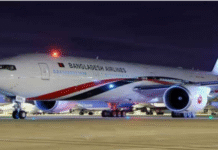

As a precautionary move, Bangladesh has started talks with the International Monetary Fund about taking a loan of $4-4.5 billion to shore up the precarious foreign currency reserves.
Yesterday, foreign currency reserves stood at $41.7 billion, which is sufficient to cover about five months’ import bill. Typically, the World Bank and the IMF prescribe an import cover of three months, but in times of economic uncertainty, they advise keeping sufficient reserves to meet 8-9 months’ imports.
After next week’s payment of $2 billion to the Asian Clearing Union — the system through which payments for trade made with Bhutan, Iran, India, Nepal, Maldives, Nepal, Pakistan and Sri Lanka are settled — Bangladesh’s foreign currency reserves may drop to less than $40 billion, meaning the import cover will be even thinner.
Going forward, even though imports are slowly contracting, the elevated inflation levels around the world mean the odds of a slowdown in both remittance inflows and export orders, two sources of foreign currency for Bangladesh, are high.
Subsequently, the loan option is being considered, said a finance ministry official involved with the proceedings.
“There is nothing to panic about — we are just being on the safe side,” he told The Daily Star.
Earlier in October last year, the Washington-based lender had offered Bangladesh $3 billion as the country’s share in the newly issued $650 billion special drawing rights (SDR) allocation for its 190 member countries to fashion an economic recovery from the pandemic slowdown.
Invented in 1969 and originally pegged to gold, SDRs are a unit created by the IMF that can sit in member countries’ reserves. They give governments vital wriggle room to redeploy funds or exchange their stock for currencies, including dollars.
The government did not take the SDR then as the country had already received large sums in budget support from multilateral lenders to fight the impacts of the pandemic.
Besides, the foreign exchange reserves were at a healthy $46 billion.
The situation took a turn for the worse with Russia’s invasion of Ukraine in February, which sent commodity prices soaring in the global market and became a serious drain on Bangladesh’s foreign currency reserves.
This prompted the government to take a series of steps to check the outflow of foreign currency including import restrictions.
The Bangladesh Bank also let the taka float to curb the need to sell dollars to keep the exchange rate stable.
The moves are expected to ease the pressure on the reserves, but the government is not leaving it to chance.
The government has opened discussions with the IMF this month, the finance ministry official said, adding that an IMF mission is due in Dhaka next month for further talks.
Whether the government goes through with the loan depends on the conditions provided by the IMF.
“The last time the IMF offered a loan, it came with a staggering 33 conditions and not all of those were agreeable by the government.”
The conditions include interest rate cuts on savings certificates, scrapping the unconditional scope to legalise untaxed money, relaxing the foreign exchange policy and lessening the BB’s intervention in the foreign exchange market.
The status of the Russia-Ukraine war and the amount needed to fight inflation in the country will also be considered when taking a call on the IMF loan, the finance ministry official said.
If the government takes the loan, it will come with less than 2 percent interest and a repayment period of 14 years.









